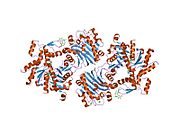WASF2
Wiskott-Aldrich syndrome protein family member 2 is a protein that in humans is encoded by the WASF2 gene.[5]
This gene encodes a member of the Wiskott-Aldrich syndrome protein family. The gene product is a protein that forms a multiprotein complex that links receptor kinases and actin. Binding to actin occurs through a C-terminal verprolin homology domain in all family members. The multiprotein complex serves to tranduce signals that involve changes in cell shape, motility or function. The published map location[6] has been changed based on recent genomic sequence comparisons, which indicate that the expressed gene is located on chromosome 1, and a pseudogene may be located on chromosome X.[7]
Interactions
WASF2 has been shown to interact with BAIAP2.[8]
References
- ^ a b c GRCh38: Ensembl release 89: ENSG00000158195 – Ensembl, May 2017
- ^ a b c GRCm38: Ensembl release 89: ENSMUSG00000028868 – Ensembl, May 2017
- ^ "Human PubMed Reference:". National Center for Biotechnology Information, U.S. National Library of Medicine.
- ^ "Mouse PubMed Reference:". National Center for Biotechnology Information, U.S. National Library of Medicine.
- ^ Suetsugu S, Miki H, Takenawa T (July 1999). "Identification of two human WAVE/SCAR homologues as general actin regulatory molecules which associate with the Arp2/3 complex". Biochem Biophys Res Commun. 260 (1): 296–302. doi:10.1006/bbrc.1999.0894. PMID 10381382.
- ^ Suetsugu S, Miki H, Takenawa T (June 1999). "Identification of two human WAVE/SCAR homologues as general actin regulatory molecules which associate with the Arp2/3 complex". Biochem. Biophys. Res. Commun. 260 (1): 296–302. doi:10.1006/bbrc.1999.0894. PMID 10381382.
- ^ "Entrez Gene: WASF2 WAS protein family, member 2".
- ^ Miki, H; Yamaguchi H; Suetsugu S; Takenawa T (December 2000). "IRSp53 is an essential intermediate between Rac and WAVE in the regulation of membrane ruffling". Nature. 408 (6813): 732–5. Bibcode:2000Natur.408..732M. doi:10.1038/35047107. ISSN 0028-0836. PMID 11130076. S2CID 4426046.
Further reading
- Jones GE (2000). "Cellular signaling in macrophage migration and chemotaxis". J. Leukoc. Biol. 68 (5): 593–602. PMID 11073096.
- She HY, Rockow S, Tang J, et al. (1997). "Wiskott-Aldrich syndrome protein is associated with the adapter protein Grb2 and the epidermal growth factor receptor in living cells". Mol. Biol. Cell. 8 (9): 1709–21. doi:10.1091/mbc.8.9.1709. PMC 305731. PMID 9307968.
- Bear JE, Rawls JF, Saxe CL (1998). "SCAR, a WASP-related protein, isolated as a suppressor of receptor defects in late Dictyostelium development". J. Cell Biol. 142 (5): 1325–35. doi:10.1083/jcb.142.5.1325. PMC 2149354. PMID 9732292.
- Wu Y, Dowbenko D, Lasky LA (1998). "PSTPIP 2, a second tyrosine phosphorylated, cytoskeletal-associated protein that binds a PEST-type protein-tyrosine phosphatase". J. Biol. Chem. 273 (46): 30487–96. doi:10.1074/jbc.273.46.30487. PMID 9804817.
- Machesky LM, Insall RH (1999). "Scar1 and the related Wiskott-Aldrich syndrome protein, WASP, regulate the actin cytoskeleton through the Arp2/3 complex". Curr. Biol. 8 (25): 1347–56. doi:10.1016/S0960-9822(98)00015-3. PMID 9889097. S2CID 16661755.
- Qualmann B, Roos J, DiGregorio PJ, Kelly RB (1999). "Syndapin I, a synaptic dynamin-binding protein that associates with the neural Wiskott-Aldrich syndrome protein". Mol. Biol. Cell. 10 (2): 501–13. doi:10.1091/mbc.10.2.501. PMC 25183. PMID 9950691.
- Stewart DM, Tian L, Nelson DL (1999). "Mutations that cause the Wiskott-Aldrich syndrome impair the interaction of Wiskott-Aldrich syndrome protein (WASP) with WASP interacting protein". J. Immunol. 162 (8): 5019–24. PMID 10202051.
- Morrogh LM, Hinshelwood S, Costello P, et al. (1999). "The SH3 domain of Bruton's tyrosine kinase displays altered ligand binding properties when auto-phosphorylated in vitro". Eur. J. Immunol. 29 (7): 2269–79. doi:10.1002/(SICI)1521-4141(199907)29:07<2269::AID-IMMU2269>3.0.CO;2-#. PMID 10427990.
- Banin S, Gout I, Brickell P (1999). "Interaction between Wiskott-Aldrich Syndrome protein (WASP) and the Fyn protein-tyrosine kinase". Mol. Biol. Rep. 26 (3): 173–7. doi:10.1023/A:1006954206151. PMID 10532312. S2CID 36018089.
- Westphal RS, Soderling SH, Alto NM, et al. (2000). "Scar/WAVE-1, a Wiskott-Aldrich syndrome protein, assembles an actin-associated multi-kinase scaffold". EMBO J. 19 (17): 4589–600. doi:10.1093/emboj/19.17.4589. PMC 302050. PMID 10970852.
- Miki H, Yamaguchi H, Suetsugu S, Takenawa T (2001). "IRSp53 is an essential intermediate between Rac and WAVE in the regulation of membrane ruffling". Nature. 408 (6813): 732–5. Bibcode:2000Natur.408..732M. doi:10.1038/35047107. PMID 11130076. S2CID 4426046.
- Marchand JB, Kaiser DA, Pollard TD, Higgs HN (2001). "Interaction of WASP/Scar proteins with actin and vertebrate Arp2/3 complex". Nat. Cell Biol. 3 (1): 76–82. doi:10.1038/35050590. PMID 11146629. S2CID 30437883.
- Millard TH, Machesky LM (2001). "The Wiskott-Aldrich syndrome protein (WASP) family". Trends Biochem. Sci. 26 (3): 198–9. doi:10.1016/S0968-0004(01)01788-1. PMID 11246027.
- Worby CA, Simonson-Leff N, Clemens JC, et al. (2002). "Drosophila Ack targets its substrate, the sorting nexin DSH3PX1, to a protein complex involved in axonal guidance". J. Biol. Chem. 277 (11): 9422–8. doi:10.1074/jbc.M110172200. PMID 11773052.
- Miki H, Takenawa T (2002). "WAVE2 serves a functional partner of IRSp53 by regulating its interaction with Rac". Biochem. Biophys. Res. Commun. 293 (1): 93–9. doi:10.1016/S0006-291X(02)00218-8. PMID 12054568.
- Eden S, Rohatgi R, Podtelejnikov AV, et al. (2002). "Mechanism of regulation of WAVE1-induced actin nucleation by Rac1 and Nck". Nature. 418 (6899): 790–3. Bibcode:2002Natur.418..790E. doi:10.1038/nature00859. PMID 12181570. S2CID 4350733.
- Strausberg RL, Feingold EA, Grouse LH, et al. (2003). "Generation and initial analysis of more than 15,000 full-length human and mouse cDNA sequences". Proc. Natl. Acad. Sci. U.S.A. 99 (26): 16899–903. Bibcode:2002PNAS...9916899M. doi:10.1073/pnas.242603899. PMC 139241. PMID 12477932.
- Innocenti M, Zucconi A, Disanza A, et al. (2004). "Abi1 is essential for the formation and activation of a WAVE2 signalling complex". Nat. Cell Biol. 6 (4): 319–27. doi:10.1038/ncb1105. PMID 15048123. S2CID 22767022.
External links
- WASF2 human gene location in the UCSC Genome Browser.
- WASF2 human gene details in the UCSC Genome Browser.







